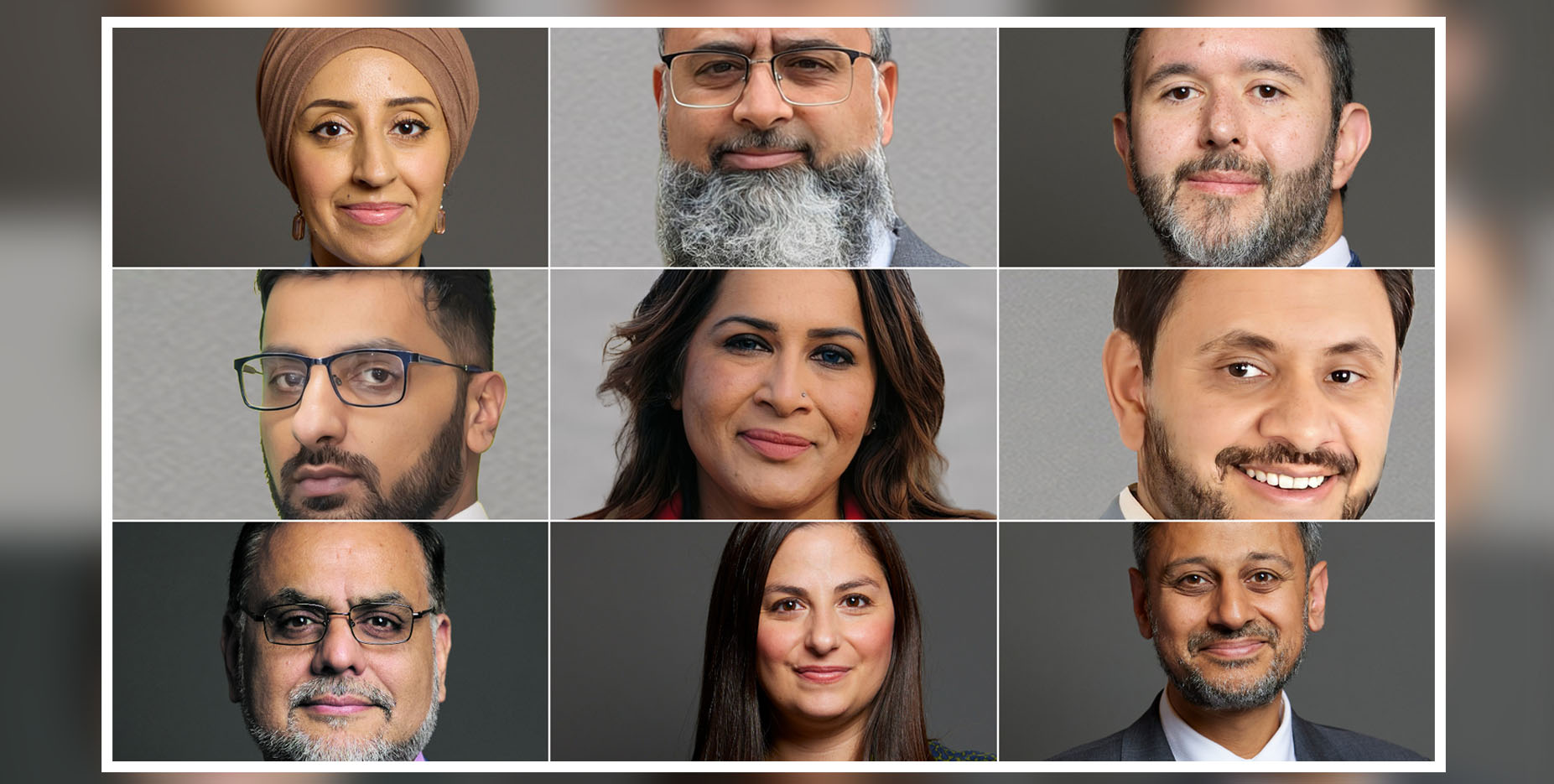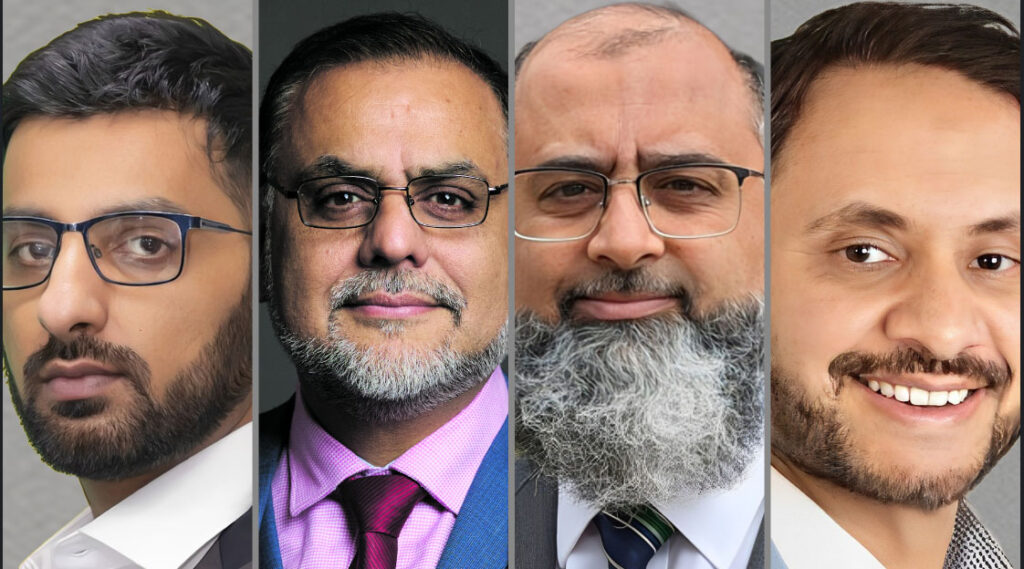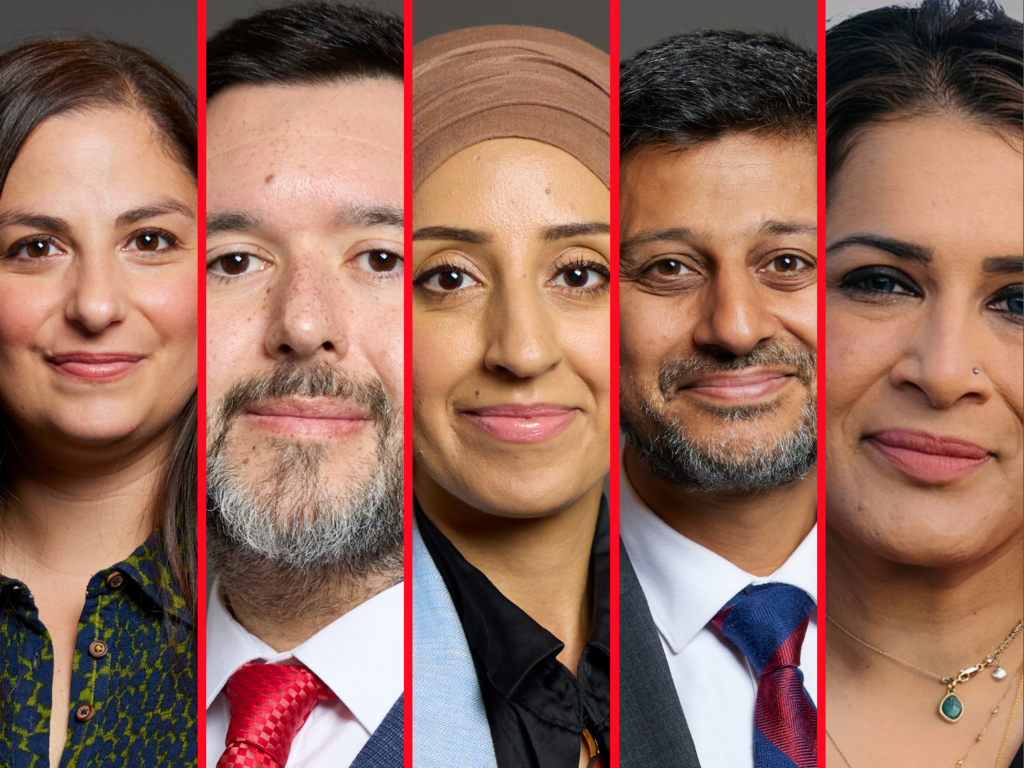
Nadine Osman
A historic UK general election saw a record number of first-time Muslim candidates winning parliamentary seats, highlighting significant gains for both Labour and independent candidates. The total number of Muslim parliamentarians has risen to 24, up from 20 in the 2019 general election. This includes 18 from Labour (mostly incumbents), four independents, and two from the Conservative Party.

Trailblazers: Meet the UK’s first Independent Muslim MPs—Adnan Hussain of Blackburn, Ayoub Khan of Birmingham Perry Barr, Iqbal Mohamed of Dewsbury and Batley, and Shockat Adam of Leicester South.
Despite a sweeping victory in the parliamentary vote, the Labour Party faced substantial electoral setbacks in areas with sizable Muslim populations, reflecting dissatisfaction with its stance on the Gaza conflict. Traditionally reliant on Muslim and other minority communities’ support, Labour’s vote decreased by an average of 10 points in constituencies where more than 10 per cent of the population identifies as Muslim, with the Workers Party of Britain or independents winning over half a million votes (1.8 per cent of the national vote).
In 2019, over 80 per cent of Muslims backed Labour. But just before the 2024 election, studies showed this support had dropped nationally by up to 20 percentage points, and in some areas, the decline was even steeper. The decline in Muslim voter support posed a significant challenge for Labour even in constituencies with smaller Muslim populations. In the 43 next-most Muslim constituencies (where Muslims make up between 15% and 30% of the population),
Labour lost an additional 300,000 votes. This means that the total decline in Labour’s vote nationally since 2019 occurred specifically within these 64 “most Muslim” seats.
The drop in Labour vote share among British Muslims played out in several constituencies, where four Muslim candidates advocating for Palestine secured seats in former Labour strongholds. This occured most dramatically in Leicester South, with a Muslim population of close to 30 per cent, where Shadow Paymaster General Jon Ashworth lost his seat to independent Shockat Adam. Iqbal Mohamed in Dewsbury and Batley, Adnan Hussain in Blackburn, and Ayoub Khan in Birmingham Perry Barr all triumphed.
Ayoub Khan clinched victory with 35.5 per cent of the vote, securing 13,303 ballots and unseating Labour’s Khalid Mahmood, who garnered 12,796 votes, marking a substantial drop of 33.9 per cent in his share. Khalid Mahmood’s defeat to a pro-Palestinian independent could have mirrored outcomes in other constituencies.
Eleven of the eighteen Labour Muslim MPs successfully retained their seats, although their majorities were notably diminished.
In Bradford West, where 59 per cent of adults identify as Muslim, Labour shadow frontbencher Naz Shah won by a narrow margin. Despite running a campaigned on a promise to persuade Sir Keir Starmer to stop arms sales to Israel her vote share dropped significantly, decreasing by 44.6 percentage points, down to 31.6 per cent. She won by only 707 votes over independent candidate Muhammed Ali Islam, who promised that Bradford would not ignore the suffering of Gazans and committed to fighting “apartheid and genocide” in Palestine.
The newly appointed Secretary of State for Justice, Shabana Mahmood, secured her seat in Birmingham Ladywood despite a significant 40.5 percent decline in her vote share, almost losing to independent candidate Akhmed Yakoob.
Similarly, in Birmingham Yardley, Jess Phillips, the new Minister for Safeguarding and former Labour leadership contender, saw her vote share drop by nearly 27 percent to 31.2 percent. Much of this lost support shifted to Jody McIntyre of the Workers Party of Britain, a Muslim convert, who received 10,582 votes, just 693 fewer than Phillips.
The trend continued in the neighbouring safe Labour wards of Hall Green and Moseley, where Tahir Ali narrowly kept his seat because independent candidates Shakeel Afsar and Mohammad Hafeez split the vote. Together, they garnered 13,301 votes, exceeding Tahir Ali’s total by 503 votes, while his share of the vote dropped by 35.5 per cent.
Rushanara Ali, the first British Bangladeshi elected to parliament, retained her seat in Bethnal Green and Stepney by a narrow margin of 1,689 votes against independent candidate Ajmal Masroor. Her seat had been considered one of the safest in the previous election.
In Ilford North, the new Health Secretary, Wes Streeting, narrowly won by just 528 votes against British-Palestinian independent candidate Leanne Mohamad. His vote share had decreased by 20.7 per cent from 2019, down to 33.4 per cent, while his 23-year-old rival secured 15,119 votes 32.2 per cent share.

Meet the new Labour MP team: Nesil Caliskan for Barking, Sadik Al-Hassan for North Somerset, Abtisam Mohamed for Sheffield Central, Dr. Zubir Ahmed for Glasgow South West, and Naushabah Khan for Gillingham and Rainham.
Despite facing significant electoral challenges in constituencies with substantial Muslim electorates, Labour continues to have the highest number of Muslim parliamentarians, totaling 18. This number includes five newly elected representatives: two replacing retiring Labour MPs, two winning seats previously held by Conservatives, and one taking a seat from the SNP.
Labour’s Abtisam Mohamed, a former city councillor, made history as the first individual of Yemeni descent to be elected as an MP. She secured victory in her first general election in Sheffield Central, a traditionally safe Labour stronghold held since 2010 by retiring MP Paul Blomfield, with 52.1 percent of the vote. Mohamed received 16,569 votes, while Angela Argenzio of the Green Party, supported by the Muslim Vote, obtained 8,283 votes.
The election of Nesil Caliskan, leader of Enfield Borough Council, marked another significant step forward for electoral diversity when she became the first person of Turkish Cypriot heritage to become an MP. Caliskan triumphed with a substantial majority of 11,054 votes, succeeding veteran MP Margaret Hodge, who stepped down.
Labour’s Sadik Al-Hassan, a pharmacist, achieved a momentous victory by unseating long-standing Conservative MP Liam Fox in North Somerset, terminating his 32-year tenure. Al-Hassan secured 19,138 votes, marking the first time a Labour MP represented the area. Fox, who held prominent government positions under Prime Ministers David Cameron and Theresa May, saw a notable decline in his vote share of 19.1 per cent.
In a significant change for Kent, traditionally a stronghold for the Conservative Party, Naushabah Khan achieved a Labour victory in Gillingham and Rainham with 15,562 votes. This exceeded the 11,590 votes received by the incumbent Conservative MP, Rehman Chishti. Chishti’s loss, combined with the resignation of former Chancellor Sajid Javid, reduced the representation of Muslim Conservatives in Parliament to two members.
In Scotland, first-time candidate and transplant surgeon Dr. Zubir Ahmed secured a significant victory for Labour in Glasgow South West, winning the seat from the SNP with 15,552 votes. The voter turnout for this election was 51.98 percent.
Anum Qaisar, the SNP’s sole Muslim MP in Scotland, lost her seat to Labour, experiencing a significant drop of nearly 14 per cent in her vote share.The SNP lost 38 seats, reducing their total from 47 to just 9 in the House of Common
Liberal Democrat leader Sir Ed Davey heralded a “historic” election night for his party, securing 71 seats—a momentous increase from their tally of 11 MPs in 2019. Despite their significant achievements, none of their 19 Muslim candidates managed to secure a seat. Khalil Yousuf was the sole contender in a closely contested constituency (Farnham and Bordon) and narrowly lost to Conservative Greg Stafford by just 1349 votes. This outcome unfolded in what British Future anticipates as potentially the most diverse Parliament in history, with 89 MPs from ethnic minority backgrounds securing seats.
READ MORE | GAZA SIEGE | SPECIAL COVERAGE
New Govt takes baby steps on Palestine as Labour loses Muslim voters
Editorial: New Government, fresh promises, but little real change
Editorial: Labour’s landslide victory: a triumph in seats, not hearts
Biden Administration loses twelfth key appointee amid controversy over US Gaza policy
Israel approves the largest West Bank land grab in 30 years
Gaza toll could surpass 186,000, reports Lancet study
Comment: Architectures of liberation; inside pro-Palestine encampments at UK universities


